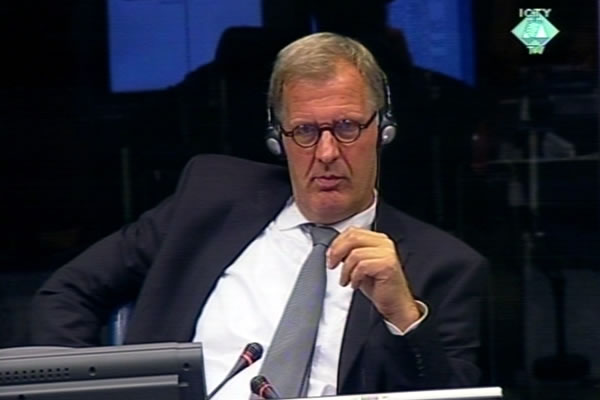Home
THE DUTCH LOST IN TRANSLATION
An officer of the Dutch Battalion testifies at the trial of Radovan Karadzic. On 11 and 12 July 1995, the witness attended all three meetings organized by General Ratko Mladic, with the representatives of the UN peace-keeping force and the refugees gathered in Potocari. On their way back to the UN base, the witness and his commander Karremans concluded that, because of the translation, they didn’t understand very well what Mladic had sought from them and the refugees and what had in fact been agreed at the meeting
 Pieter Boering, witness at the Radovan Karadzic trial
Pieter Boering, witness at the Radovan Karadzic trial Pieter Boering, who served in the UN Dutch Battalion in Srebrenica, testifies at the trial of Radovan Karadzic. From January to July 1995, Boering was a liaison officer of the Dutch Blue Helmets with the VRS, BH Army and the civilian authorities in the enclave. Together with his commander, Colonel Karremans, the witness attended all three meetings in the Fontana Hotel in Bratunac on 11 and 12 July 1995 with Ratko Mladic, the Dutch commanders and the representatives of the refugees gathered in Potocari.
The witness’s statement based on his previous testimonies in all Srebrenica trials was admitted into evidence. In a brief examination-in chief, the prosecutor focused on the third meeting in the Fontana Hotel held in the morning of 12 July 1995. In the presence of Karremans and Boering, Mladic told the terrified representatives of the refugees in Potocari that they could ‘survive or disappear’. If they wanted to ‘survive’, they had to comply with Mladic’s demand: all men had to surrender their weapons and then they would be allowed to ‘go wherever they want to’.
In parts of the meeting that were not recorded or were edited out of the recording, the people discussed how the men would be divided into groups based on their age once they lay down the arms; boys younger than 15 and men older than 70 would be left out, the witness explained. In the recording, Boering was able to recognize a civilian whose role was to do the ‘triage’ and separate the ‘war criminals’ from the rest. Boering couldn’t remember the civilian’s name.
On their way back to Potocari, Boering and Karremans decided that their perception of what had been agreed at the meeting differed. Having realized that they didn’t in fact understand quite well what had been concluded, Boering returned to Bratunac and asked Momir Nikolic to give him some additional clarifications. Nikolic wasn’t in the mood to talk and told Boering he should return to Potocari. The only thing that Nikolic told Boering was ‘it’s clear what is going to happen’.
In the cross-examination, Karadzic recalled the evidence of Boering’s colleague Johannes Rutten about the films he had handed to the Dutch authorities after he returned from Srebrenica. Rutten explained he was later told that ‘something went wrong’ when the pictures were being developed. Karadzic pointed to a report of 18 August 1995 which states that a Dutch officer by the name of Bloeming told Rutten that ‘films have more potential ramifications than expected’, advising Rutten ‘not to speak about it’. The witness replied to Karadzic that he didn’t know anything about it.
Prosecutor Nicholls objected to the fact that the question was not put to Rutten during his evidence yesterday. After presiding judge Kwon dismissed Karadzic’s complaint that he didn’t have enough time to examine Rutten, Karadzic’s legal advisor Peter Robinson stood up. Robinson explained that the document was found yesterday, after Rutten completed his evidence. Robinson added that this was a ‘consequence of the chaos situation Karadzic finds himself in’. The Trial Chamber nevertheless dismissed the application to admit the document into evidence through this witness, because he didn’t know anything about it.
Just as he did in his cross-examination of Rutten, Karadzic again claimed that the enclave had not been demilitarized, and that there had been many well-armed BH Army troops there. Those soldiers would leave Srebrenica clandestinely to ‘burn Serb villages’ and would return with ‘bloody trophies’ such as ‘necklaces made of the noses and ears’ of the Serbs they had killed, Karadzic said. The witness replied he was unaware of it. Karadzic then accused the witness of being biased and of ‘preferring to remember Serb sins than those of the Muslims’.
Karadzic will continue cross-examining Pieter Boering on Wednesday, 30 November 2011.
Linked Reports
- Case : Karadzic
- 2011-11-28 KARADZIC: PRISONERS THREW THEIR DOCUMENTS AWAY
- 2011-11-24 EXECUTION IN ORAHOVAC
- 2011-11-24 THOSE WHO FLED, THOSE WHO WERE EXPELLED AND THOSE WHO WERE DESPERATE
- 2011-11-30 WITNESS: EVERYTHING WAS ORGANIZED IN SREBRENICA
- 2011-12-01 EVIDENCE FROM MASS GRAVES
- 2011-12-02 ANTHROPOLOGICAL EVIDENCE FROM MASS GRAVES
